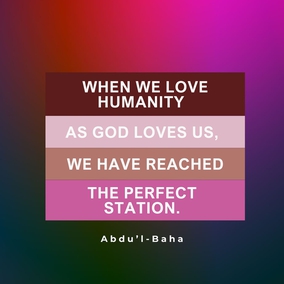The views expressed in our content reflect individual perspectives and do not represent the authoritative views of the Baha'i Faith.
Enthused about an idea for a project, I mentioned it to an acquaintance at an out-of-town event. She liked the idea and had some suggestions for follow-up — which meant we needed to consult.
I did my homework and got back to her by email a couple of weeks later. In her reply she asked if we could continue the discussion by phone instead. So over the next three days we played phone tag, missing each other time and again. Even when we agreed on a specific time for a call, something or other got in the way.
Finally, we had our conversation today, and I asked her why she had insisted on telephone rather than email. She said that she prefers talking with people, that too many nuances and cues are missing in email.
Okay, I do understand her point, though one could also say that a telephone call is lacking compared to talking face-to-face. Yet other people might argue the opposite, claiming that the time delay inherent in email allows better consideration of ideas. We could also throw into the mix the possibility of texting or video conferencing for real-time communications, or even the ways it used to be done, via letters, memos, and meetings.
Whew — communication gets complicated with so many choices! Do options and convenience indicate improvement in communication effectiveness? Does change mean progress?
In the mid-1800s Henry David Thoreau wrote: “All our inventions are but improved means to an unimproved end.”
As witty and insightful as this is, and as respected as Thoreau may be as a thinker and author, I do find it rather cynical. Nevertheless, this quotation can remind us about the difference between development and progress. A new invention may have technological significance, but that doesn’t mean it helps us achieve our goals any better than its predecessors.
Moving to more recent times, we have Marshall McLuhan, whose words have become embedded in our culture. He said “The medium is the message.”
With yet another perspective, we might also consider insights from today’s high-tech thinkers and leaders such as Mark Kvamme, who said: “No new medium ever completely replaces another. Even cave paintings haven’t gone away — we just call them graffiti.”
Ideas like these converge around the basic question about the very nature of communications. At its essence, communicating constitutes an innate characteristic of being human. Whatever may be the truth about the medium, the message, and innovation — we all need to communicate.
Baha’u’llah predicted an increased range of communications and its role in creating unity. As summarized by the Guardian of the Baha’i Faith, Shoghi Effendi:
The unity of the human race … implies the establishment of a world commonwealth in which all nations, races, creeds and classes are closely and permanently united … A mechanism of world inter-communication will be devised, embracing the whole planet, freed from national hindrances and restrictions, and functioning with marvellous swiftness and perfect regularity.
Our communications may be spoken, written, broadcast, or otherwise expressed. In any case, we can check for coherence between words and deeds. Is there energy and commitment? When other people are involved, do we listen and persist until we have reconciled any differences? Is there congruence — are the outer form and inner essence in harmony? Is there power in the communications — power derived from sincere concern for others?
In these days of so many ways to communicate, quantity is easily confused with quality. In the meantime, I ask myself these sorts of questions and check to see if I’m on track for communications that can make a difference.















Comments
Sign in or create an account
Continue with Googleor